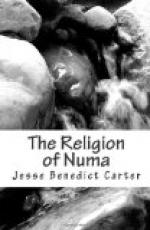THE AUGUSTAN RENAISSANCE
Politics had caused the downfall of the state religion. Weakened by the attacks of a sceptical philosophy, driven from the hearts of the common people by the rival cults of the Orient, the state religion had finally lost all its influence by the abuse of it as a political tool. Its priesthoods were deserted, its temples were falling into ruins with the grass carpeting their mosaic pavements and the spiders weaving new altar cloths. To us with our modern ideas it would have seemed impossible that this state religion could ever rise again; and probably no other state religion that the world has ever seen could have been brought to life again, because no other state religion has ever been so absolutely a part of the state, unless the state itself were a theocracy; and possibly no lesser genius than Augustus could have accomplished the task even under the slightly more favourable conditions which the state religion of Rome offered. Whether Julius Caesar would have attempted the restoration is one of the many questions which his death left unanswered. Certainly thoughtful men of his day hoped that he would, and it was in this hope that Varro dedicated his Divine Antiquities to him; and another contemporary, Granius Flaccus, his book On the Invocation of the Gods. But except for one law which he caused to be enacted “concerning the priesthoods,” we have no knowledge either of his accomplishment or of his intentions, and the great task was left practically untouched for the master-hand of Augustus.
In order that we may understand what Augustus did and how he managed to succeed in relation to the state religion we must obtain some idea of the whole scheme of Augustus in relation to the state at large, of which his religious reorganisation was merely a part. One of the cleverest characterisations of the Emperor Augustus which has ever been written was that by the late Professor Mommsen, but its relatively secluded position in the Latin preface to an edition of Augustus’s great autobiography, the Res Gestae, has prevented it from being generally known. Mommsen describes Augustus as “a man who wore most skilfully the mask of a great man, though himself not great.” This epigrammatic statement is undoubtedly clever but it is not just, although it is the opinion concerning Augustus which we would expect a man to hold who, like Mommsen, had an almost unbounded admiration for Julius Caesar. There have been scattered through the pages of history even down to our own day men of whom we say that they were not great men, though they did a great work. In certain cases doubtless we can separate the man from his work and justify the assertion, but in other cases we are deceived by the man himself just as his contemporaries were and as he wished them to be. For it occasionally happens that a man who is called to rule over men and to reorganise a disordered government is able best




